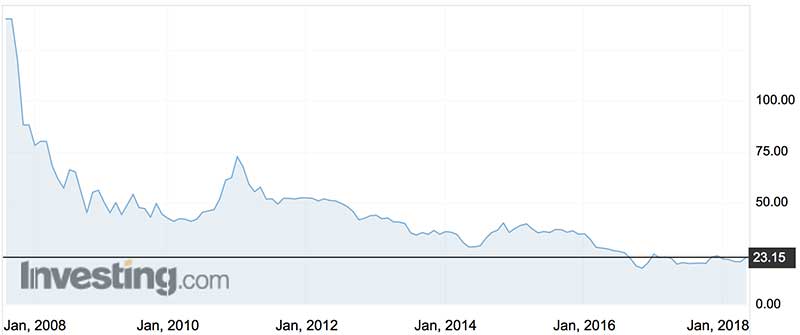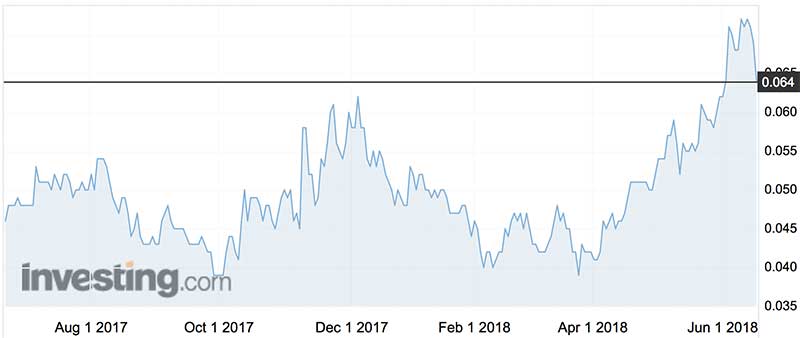Uranium is recovering and Boss Resources has an edge
Mining
Advanced uranium explorer Boss Resources is already fielding sales inquiries as market sentiment improves, writes Barry FitzGerald in his weekly Garimpeiro column.
A bunch of ASX-listed uranium juniors stand ready to benefit from the nascent recovery in the uranium market.
Boss Resources (ASX:BOE) is among them and has an edge on the competition courtesy of its ownership of the Honeymoon project in South Australia, 75km north-west and across the border from Broken Hill.
While much of its competition has to wait for a full blown recovery in the uranium market before even thinking about getting in to production, Boss could have Honeymoon back in production within nine months for a restart cost of about $US10 million, leveraging off $170 million in existing infrastructure.
The advanced status of the project — and the turning sentiment in the uranium market — has already prompted verbal inquiries to Boss about offtake agreements.
But first Boss needs to complete a definitive feasibility study – due in the first half of next year – in to a three-stage re-start plan.
And while Honeymoon has the potential to be a low capex-low cost producer, Boss is no different to the rest of the uranium pack in wanting to see uranium prices continue to recover from 15-year lows.
A tentative uranium price recovery is underway.
Spot prices (about 30 per cent of the market) have edged up from $US19.60/lb in May last year to $US23.40/lb.
(See chart below).

Long-term contract prices (70 per cent of the market) are $US30/lb.
Current prices are still well below the June 2007 peak price of $US136/lb (spot)/$US95/lb (long-term).
More to the point — as much as 70 per cent of the global industry is losing money at current prices.
Uranium’s price weakness is despite widespread acknowledgement that there is a need to build new mines to meet forecast annual growth in demand from 170m/lbs to 200m/lbs by the end of the decade.
Boss for one is confident that the nascent price recovery will continue, estimating that $US50-$US60/lb prices are needed as an incentive for new mines to be built.
So much so that it is prepared to reshape itself to make Honeymoon its sole focus by seeking offers for its 49 per cent interest in the promising Golden Hill gold project in Burkina Faso, a joint venture with the Canadian-listed Teranga Gold.
The stake has a $10 million-plus price tag.
The Honeymoon project – it is said to be named after a tin shed built in the area by a pastoralist for his honeymoon – was originally developed by Russian/Canadian group Uranium One and Japan’s Mitsui.
Mitsui had left the joint venture by the time production was halted in 2013 due to collapse in uranium prices post the 2011 Fukushima disaster in Japan, and shortcomings in the project reaching design capacity due to lower-than-forecast uranium levels in the solution delivered to the solvent extraction (SX) treatment plant.

Since it acquired the project in 2015 – it moved from 80 per cent to 100 per cent in the March quarter – Boss has de-risked Honeymoon’s return to production through field leach trials which exceeded expectations, and by planning an upgrade to ion exchange (IX) recovery.
Boss estimates that restarting the SX operation for annual production of 880,000/lbs of uranium would cost $US10m.
It plans to follow up with the introduction of an IX circuit at a cost of $US58 million, with annual output to rise to 2m/lbs. Expansion of the IX circuit at a cost of $US78 million could lift annual output to a globally significant 3m/lbs annually.
Boss has estimated life-of-mine all in sustaining costs of less than $US24/lb, and cash costs of less than $US16/lb.
In support of its plans Boss recently raised $8 million and appointed Tribeca Investment Partners to arrange project finance of up to $US65 million.
Boss last traded at 6.4c for a market cap of $100 million (see graph above).
The stock is highly sensitive to movements in the uranium price — something highlighted in an in-depth report on Boss by London’s Shard Capital.
The report (May 22) had a 10.5c price tag on Boss, using a 2021 uranium price assumption of $US55/lb (long-term).
Shard assessed the unrisked net present value of Honeymoon at an 8 per cent discount rate at 20c a share.
Plug in $US80/lb prices and the NPV becomes 41c a share.